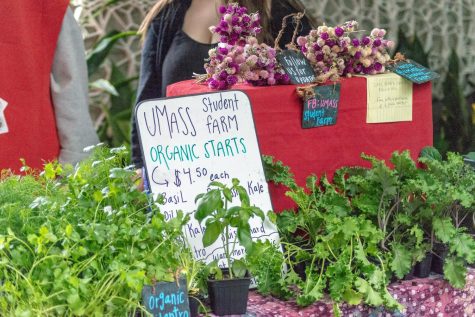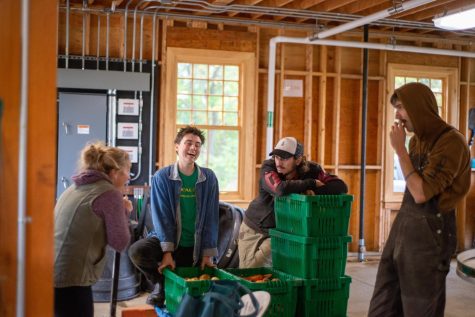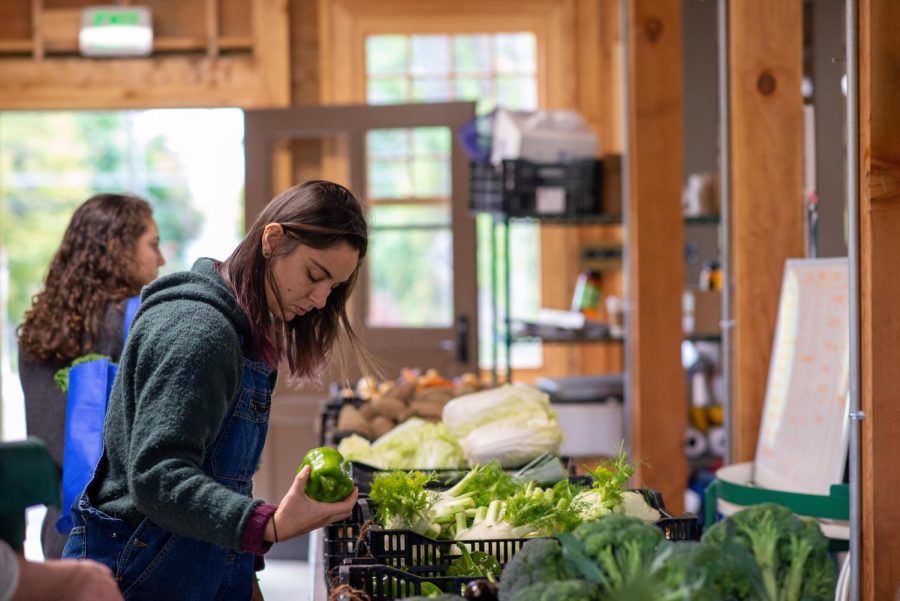In the UMass Research and Education Greenhouses, student farmers met to seed flower beds, transfer seedlings into pots and talk about sustainable farming practices.
“What needs more room to stay happy?” Farm Manager Jason Dragon asked the student farmers. He demonstrated how to pot newly developed tomato plants and provided some inspiration along the way. “They’re gonna look a little unhappy during the process, because just like all of us when we’re uprooted, it’s stressful. But, give us a little water and sunshine and usually we’ll be alright.”
Dragon graduated from UMass with a degree in creative writing and Latin American studies, but found his calling in sustainable farming. “I didn’t know what to do with my life, so I went to go work on a farm and I never looked back. I really fell in love with the work and the community aspect of farming.”
Now, Dragon works with the UMass Student Farm to teach students about sustainable farming. “It’s a great program and I’m lucky enough that every year new folks come through, we make new friends and do good work.”
As a senior in the program, sustainable food and farming student Amber Gray plans to share her work with the campus community through an upcoming community workshop farmer’s market on April 22.
“It’s a natural tie-dye workshop! We’ll bring homemade dyes and have people practice clothing making with natural materials,” Gray said. “Natural dyes actually do a better job protecting the body against UV rays than synthetic dyes do.” A recent paper from the International Journal of Applied Home Science confirms that natural dyes can help block 80 percent of harmful UV rays.

Alongside the natural-dye-producing plants, the Student Farms prides themselves on producing an extensive range of produce, herbs and flowers.
Recently, the Student Farm began planting more edible and medicinal flowers, like echinaceas.
“Echinaceas are immune-support powerhouse plants,” Gray said. Often, they’re used in tea and were found in quarantine dorms in 2021 within echinacea tea packets.
The Student Farm aims to plant the medicinal flowers in no-till fields, which are considered to have a high level of sustainability.
“When you till and put a tractor on the soil, you create a layer called the plow pan, which is soil that is so compacted that roots can’t get through it,” explained sophomore farmer Lauren Duhr, who’s majoring in psychology and sustainable foods and farming. “In no-till, you’re allowing the soil to regenerate itself and stay the way it’s naturally supposed to be.”
Specifically, perennials, or flowers that return naturally during multiple growing seasons, are the types of plants ideal for no-till fields. “There’s a big push in the sustainability community for perennials, you don’t have to till them,” Gray said.
Members of the UMass community that want to support the Student Farm and receive a weekly package of produce can sign up for a share in the Community Supported Agriculture Program.

“Members of the CSA program come to the ALC barn and get 25-35 pounds of fresh produce every week,” Duhr said. In addition, those that sign up before May 1 get a free chicken courtesy of the Stockbridge meat CSA program, $25 off their order and free Student Farm merch.
The Student Farm also sells produce to UMass dining and four Big Y locations, but they try to limit competition with other local farms.
“We only sell to the campus community so we don’t take their business away,” Gray explained. “Healthy competition isn’t even competition, it’s working together and struggling together.”
Ultimately, those working for the Student Farm are dedicated to sustainable farming and promoting regenerative agriculture no matter the conditions.
“You don’t do it to make money, you do it because you care,” Gray said.
Lucas Ruud can be reached at [email protected] and followed on Twitter @LukeRuud.




















Judy Feeney • Mar 31, 2022 at 7:43 pm
What a great article! It’s nice to see Jason doing what he really enjoys. And he’s feeding people good, healthy food.
Congratulations Jason!